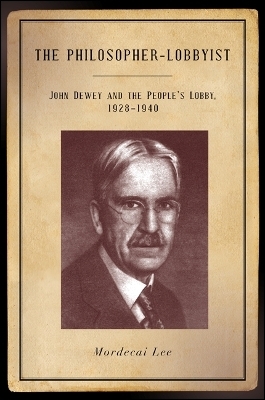
The Philosopher-Lobbyist
State University of New York Press (Verlag)
978-1-4384-5529-7 (ISBN)
John Dewey (1859–1952) was a preeminent American philosopher who is remembered today as the founder of what is called child-centered or progressive education. In The Philosopher-Lobbyist, Mordecai Lee tells the largely forgotten story of Dewey's effort to influence public opinion and promote democratic citizenship. Based on Dewey's 1927 book The Public and Its Problems, the People's Lobby was a trailblazing nonprofit agency, an early forerunner of the now common public interest lobbying group. It used multiple forms of mass communication, grassroots organizing, and lobbying to counteract the many special interest groups and lobbies that seemed to be dominating policymaking in Congress and in the White House. During the 1930s, Dewey and the People's Lobby criticized the New Deal as too conservative and championed a social democratic alternative, including a more progressive tax system, government ownership of natural monopolies, and state operation of the railroad system. While its impact on historical developments was small, the story of the People's Lobby is an important reminder of a historical road not traveled and a policy agenda that was not adopted, but could have been.
Mordecai Lee is Professor of Governmental Affairs at the University of Wisconsin–Milwaukee. He is the author of several books, including The First Presidential Communications Agency: FDR's Office of Government Reports, also published by SUNY Press, and Promoting the War Effort: Robert Horton and Federal Propaganda, 1938–1946.
Preface and Acknowledgments
Abbreviations
Introduction
Part I. Inventing the People’s Lobby
1. John Dewey and Benjamin Marsh before the People’s Lobby
2. Constructing the People’s Lobby, 1928–1931
Part II. Dewey as President of the People’s Lobby
3. Policy Advocacy during the Coolidge and Hoover Presidencies, 1928-1932
4. Lobby Operations and Conservative Attacks, 1928–1932
5. Policy Advocacy during FDR’s First Term: Criticizing the First New Deal as Too Conservative, 1933–1934
6. Policy Advocacy during FDR’s First Term: Criticizing the Second New Deal as Too Conservative, 1935–1936
7. Lobby Operations and Conservative Attacks during FDR’s First Term, 1933–1936
Part III. Dewey as Honorary President of the People’s Lobby and After
8. Policy Advocacy during FDR’s Second Term, 1937–1940
9. Lobby Operations and Conservative Attacks during FDR’s Second Term, 1937-1940
10. Policy Advocacy and Lobby Operations after Dewey: World War II and Postwar America, 1941–1950
11. Denouement and After
Conclusion
Notes
Bibliography
Index
| Zusatzinfo | Total Illustrations: 1 |
|---|---|
| Verlagsort | Albany, NY |
| Sprache | englisch |
| Maße | 152 x 229 mm |
| Gewicht | 227 g |
| Themenwelt | Geschichte ► Allgemeine Geschichte ► Neuzeit (bis 1918) |
| Geschichte ► Allgemeine Geschichte ► 1918 bis 1945 | |
| Geisteswissenschaften ► Geschichte ► Regional- / Ländergeschichte | |
| Geisteswissenschaften ► Philosophie ► Philosophie der Neuzeit | |
| Sozialwissenschaften ► Politik / Verwaltung ► Politische Theorie | |
| ISBN-10 | 1-4384-5529-1 / 1438455291 |
| ISBN-13 | 978-1-4384-5529-7 / 9781438455297 |
| Zustand | Neuware |
| Informationen gemäß Produktsicherheitsverordnung (GPSR) | |
| Haben Sie eine Frage zum Produkt? |
aus dem Bereich


